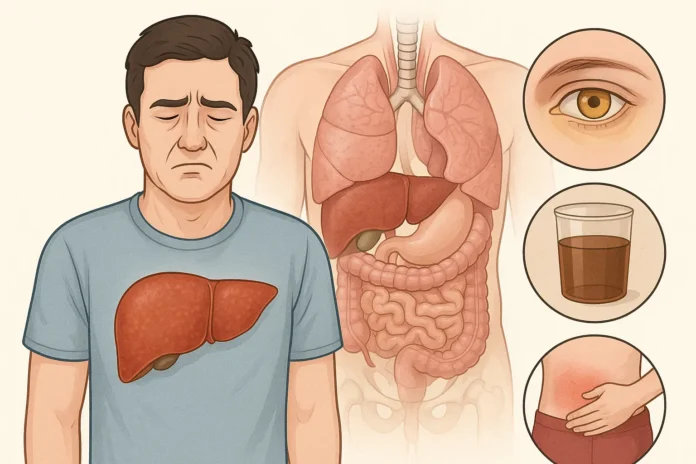Your liver is a silent hero, working tirelessly to detoxify your body, regulate hormones, balance blood sugar, and support digestion.
But when it’s under stress, it doesn’t always send loud signals. Instead, it offers subtle signs that something’s wrong—signs that are easy to dismiss or overlook.
Ignoring these early symptoms could lead to serious conditions like fatty liver disease, hepatitis, or even cirrhosis.
The good news? Your liver is incredibly resilient and can recover—if you catch the warning signs early and take action.
Here are 15 quiet but serious signs your liver may be in trouble:
Your liver is a silent hero, working tirelessly to detoxify your body, regulate hormones, balance blood sugar, and support digestion.
But when it’s under stress, it doesn’t always send loud signals. Instead, it offers subtle signs that something’s wrong—signs that are easy to dismiss or overlook.
Ignoring these early symptoms could lead to serious conditions like fatty liver disease, hepatitis, or even cirrhosis.
The good news? Your liver is incredibly resilient and can recover—if you catch the warning signs early and take action.
Here are 15 quiet but serious signs your liver may be in trouble:
1. Constant Fatigue
Feeling exhausted all the time—even after a good night’s sleep? A sluggish liver struggles to filter toxins, causing your energy to drop dramatically.
What to do: Prioritize sleep, eat whole foods, and reduce sugar and caffeine. Support your liver with leafy greens and antioxidant-rich foods.
2. Yellowing Skin or Eyes (Jaundice)
A yellow tint in your skin or eyes means bilirubin is building up, indicating your liver isn’t processing waste efficiently.
What to do: Seek medical attention immediately. Avoid alcohol and fatty foods to reduce liver strain.
3. Dark Urine Despite Drinking Water
Urine that remains dark even when you’re hydrated can mean the liver isn’t filtering properly.
What to do: Drink more water and consult a doctor for liver function tests.
4. Pale or Clay-Colored Stools
Your liver produces bile for digestion. If your stools are pale or clay-colored, bile flow may be blocked.
What to do: Monitor your digestion and eat liver-friendly foods like artichokes, beets, and turmeric.
5. Abdominal Pain or Swelling
Pain or bloating in the upper right abdomen—where the liver is located—can signal inflammation or fat buildup.
What to do: Eat lighter meals and schedule a medical checkup. Yoga or light walking can relieve discomfort.
6. Unexplained Weight Loss
Losing weight without trying? Liver dysfunction can disrupt your metabolism.
What to do: Keep a food and weight journal. Focus on nutrient-dense meals and consult a healthcare provider.
7. Loss of Appetite
If you feel full quickly or just don’t feel like eating, it could mean your liver isn’t functioning efficiently.
What to do: Eat small, balanced meals with protein and fiber. Avoid greasy, processed foods.
8. Nausea and Vomiting
Frequent nausea, especially after eating, might be due to poor liver detoxification or bile production.
What to do: Drink ginger or peppermint tea. If symptoms persist, get a medical checkup.
9. Itchy Skin (Without a Rash)
Liver problems can cause bile salts to build up under the skin, leading to unexplained itching.
What to do: Moisturize regularly, avoid hot showers, and get tested for liver function.
10. Swelling in Legs or Ankles
Fluid buildup in the lower body (edema) is often a sign of advanced liver disease or cirrhosis.
What to do: Elevate your legs, reduce sodium intake, and consult a doctor urgently.
11. Easy Bruising or Bleeding
The liver helps produce proteins for blood clotting. If it’s failing, you may bruise easily or bleed more than usual.
What to do: Avoid risky activities and get a full blood panel to evaluate liver health.
12. Hormonal Imbalance
A poorly functioning liver can disrupt hormone levels, leading to irregular periods, low libido, or breast enlargement in men.
What to do: Keep track of symptoms and support hormone balance with healthy fats, sleep, and stress management.
13. Mental Fog or Confusion
Difficulty focusing or memory lapses could be a sign of hepatic encephalopathy, caused by toxins in the blood reaching the brain.
What to do: Reduce alcohol intake, sleep more, and seek urgent medical care if symptoms worsen.
14. Unusual Breath Odor
A musty or sweet odor on your breath—called “fetor hepaticus”—is a rare but serious sign of liver failure.
What to do: Maintain good oral hygiene and consult a doctor for liver function tests immediately.
15. Spider Veins or Red Palms
Tiny blood vessels visible on your face, chest, or limbs, and red palms (palmar erythema), are signs of liver-related hormonal changes.
What to do: Limit alcohol, eat anti-inflammatory foods, and get your hormone levels and liver enzymes checked.
